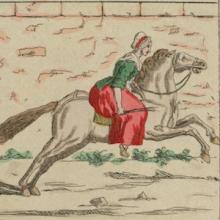Women

Trust Territory Photo Archives
The images in the collection are an extensive record of American views of Micronesian peoples, society, and culture and of the interaction between the United States and the Trust Territories.
Bund Deutscher Maedel
The historical materials provide glimpses of girls' activities and appearance, and the primary source images and text illustrate the friendships among young women and girls. It also depicts the ways in which a modern state could appropriate girlhood.Short Teaching Module: Women's Travel Writing
Women’s travel writing is a rich source for teaching world history. In this module, Patricia M.E. Lorcin explains how she uses two examples of women's travel writing to help students better understand a wide range of issues in world history.

Chinese Posters: Propaganda, Politics, History, Art
Chinese Posters offers a rich collection of over 1,600 Chinese propaganda posters, representing a time period from 1841 to the present day, and a rich range of political, social, cultural, and visual themes.
Source Collection: Women and the Revolution
Women participated in virtually every aspect of the French Revolution, but their participation almost always proved controversial. Women's status in the family, society, and politics had long been a subject of polemics.

Africa Focus: Sights and Sounds of a Continent
By using the search filters effectively, teachers can have students compare and contrast various images of worship, schooling, work, and landscapes to highlight the vast cultural and ecological diversity of Africa.
Swaziland Digital Archives
Featuring approximately 600 photographs chronicling daily life and politics in Swaziland, the Swaziland Digital Archives provides visual insights into the experiences of childhood and adolescence in southern Africa over the past century.Excerpt from Against Neaira
In this speech Against Neaira revolves around the activities of a non-Athenian courtesan and reveals information about “proper” Athenian women. Note that several of the accusations involve the woman in question, Neaira, simply eating and drinking with men in public.
Short Teaching Module: Women in Classical Athens and Sparta
Primary texts about women in classical Athens and Sparta provide an excellent, if extreme, example of one of the main themes in the 100-level “World History to 1500.” This theme is the relationship between social structure and political institutions.
Moralia
Part of Plutarch's Moralia, these sayings by Spartan women demonstrate not only the martial culture of Sparta that emphasized physical courage and honor, but also the role of women in reinforcing that culture.